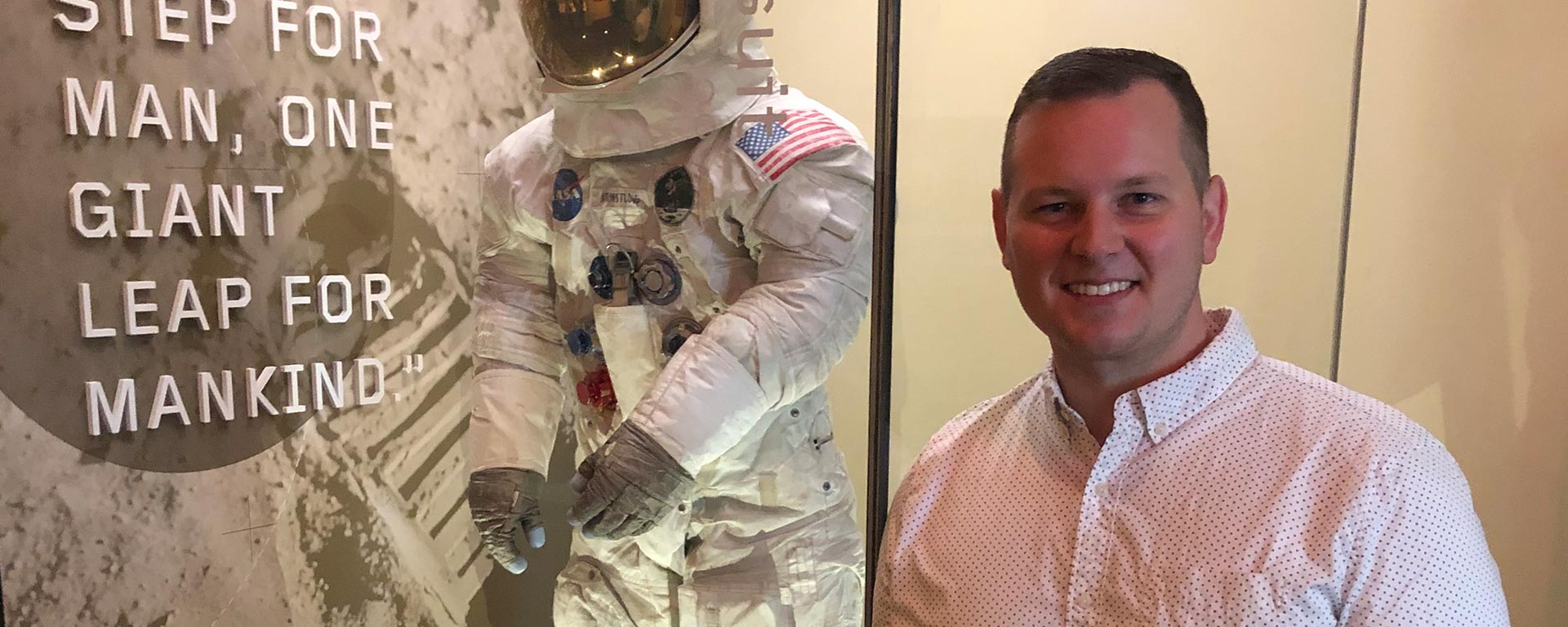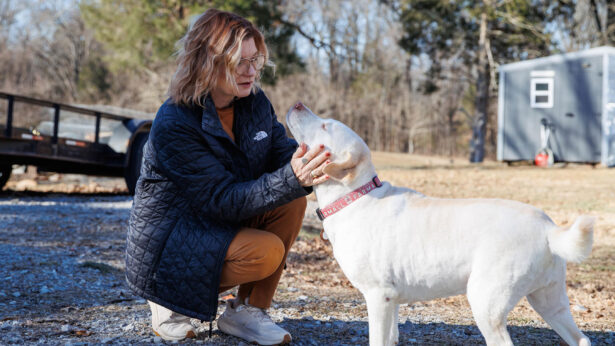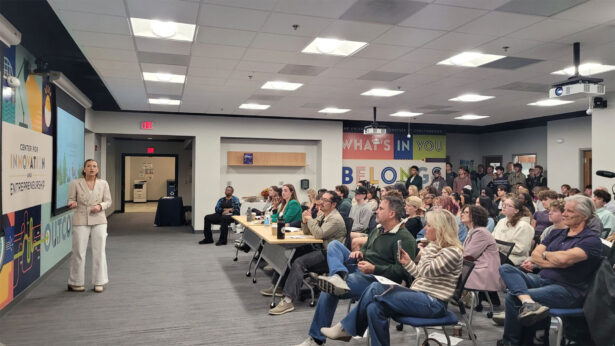If Charles “Aaron” Bolen kept a bucket list for each chapter of his life, his progress would be out of this world. Literally.
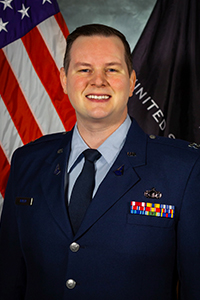
Bolen, who has a bachelor’s degree in aerospace engineering from UT Knoxville (’15) and a master’s degree in engineering management from UT Chattanooga (’22), is a program manager in the U.S. Space Force assigned to the National Reconnaissance Office in Chantilly, Virginia.
“It’s my job to lead the development of the world’s most capable and innovative overhead reconnaissance systems (satellites) to collect intelligence for U.S. national security and to support disaster relief and humanitarian efforts,” says Bolen, who recently was named to UT Knoxville’s 40 Under 40 list.
Bucket List: Launch a military career
A native of Cleveland, Tennessee, Bolen decided early that he wanted to be an engineer and have a career in the Air Force. A lifelong fan of the Tennessee Vols, Bolen knew UT Knoxville was the college for him. He could study aerospace engineering and join Air Force ROTC (AFROTC).
“It checked all the boxes,” he says.
Outside of his studies, Bolen found “several little campus communities that shaped and formed what and who I am.”
He worked at TRECS, mowing lawns and taking care of equipment. He lived and worked at Baptist Collegiate Ministry.
“Aaron’s warm demeanor, dependability and generosity made him a great candidate to serve as our resident advisor,” says Samantha “Samm” Hawes, Baptist Collegiate minister. “He served by not only caring for the building but caring for the students themselves.”
AFROTC proved challenging and competitive, and Bolen thrived on it.
“You had to apply yourself as hard as possible in school and out of school as well,” he says.
“I remember Aaron as an ever-positive young man with boundless energy,” says Lt. Col. Michael R. Wilson, UT AFROTC’s director of operations from July 2012 to June 2016 and now commander of the 332nd Recruiting Squadron in Nashville. “He had a natural curiosity and thirst for knowledge. Aaron always sought ways to help others and be involved in the community. His transformational leadership style inspired his peers and all the cadets.”
Retired Col. Brian “Taz” Delamater, commander of UT AFROTC from May 2011 to July 2013, is now the senior director of business development and a civilian F-16 adversary air aggressor pilot for Top Aces, a privately owned company that provides advanced airborne training to some of the world’s leading air forces.
“Aaron had a willingness to step up and speak to his convictions even if that introduced risk of failure or embarrassment. He never hesitated to make a decision while many of his peers were more comfortable laying low and staying off the radar,” he says.
Delamater recalls having the AFROTC sophomore class at his house for a barbecue.
“Perhaps I shouldn’t have been surprised that most never spoke with my wife outside of the obligatory ‘hello’ or ‘thank you.’ But Aaron was one of the few that did. He had a genuine way of connecting with people. He spoke with my wife, as well as my children, and he led the group in a prayer before we ate. All of this was on his own; he wasn’t encouraged or pushed at all.”
Before graduating and being commissioned, Bolen and the other AFROTC cadets completed “dream sheets,” listing their preferred work fields and locales.
Bolen chose “acquisitions” because he loved working on teams and strategic planning. He also chose San Antonio—because it was as close as he could get to Dallas, where his girlfriend, now wife, Mallory (Knoxville ’12), was working for Teach for America.
Shooting for Star(dom)
Being in the military means frequent moves, and Charles “Aaron” Bolen thinks of each new assignment as an adventure. So he creates a bucket list of places to see and things to do in each place he lives.
Now in Virginia, he’s looking forward to exploring some Civil War battlefields, walking the Freedom Trail in Boston and venturing to Maine to see the settings of Stephen King’s novels.
When he was in California, his goal was to appear on TV.
He got free tickets for a taping of the game show The Price is Right, and he noticed how the show’s producers casually auditioned audience members by looking them over and chatting them up.
The next time he went to a taping of the show, Bolen was ready.
“I wore a bright blue Hawaiian shirt and acted cheesy as heck,” he says.
Sure enough, he was chosen to “Come On Down!” After making the “closest without going over” bid in the opening game, he competed on stage alongside emcee Drew Carey.
He didn’t win big, but he loved the experience. It prompted him to create a profile on several acting websites in hope of being recruited as an extra in TV shows. He uploaded a photo and described himself as a perfect fit for military or law-enforcement roles.
“I got a phone call. They liked my picture,” he says.
He appeared in nonspeaking roles in three episodes of In Ice Cold Blood, an Oxygen network true-crime drama featuring actors dramatizing a crime while the actual people involved tell their story.
While acting won’t take the place of his military career, it was a hoot—a fun way for a Space Force guy to feel momentary stardom.






Bucket List: Acquire Cyber Expertise
Bolen’s first assignment was to the Responsive Cyber Acquisition Branch at Joint Base San Antonio-Lackland Air Force Base in Texas.
State-of-the-art cyber capabilities are critical to America’s economy and security, Bolen says. Cyber is the newest and only man-made warfighting domain, alongside air, land, sea and space.
Bolen’s job involved replacing and updating satellite equipment by soliciting bids from industry to build new equipment and looking for cutting-edge commercial technology that could be adopted by
the military.
A year in, Bolen was chosen to serve as executive officer to the senior material leader in the base’s Cryptologic and Cyber Systems Division.
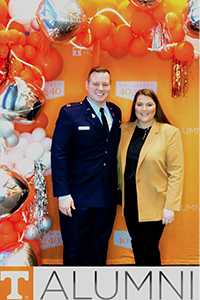
“On the hierarchy of project managers, (the senior material leader) was the top,” Bolen says, explaining that the year-long assignment allowed him to manage the leader’s schedule, work the front office and accompany his boss on work trips. “It was an incredible job. I was very fortunate he saw potential in me.”
Bolen spent his final year in Texas as program manager for the Cyberspace Defense Analysis Cyber Weapon System in the base’s Defensive Cyber Branch. There, he oversaw the development of cyber warfighter tools and capabilities.
Bucket List: Start an Innovative Program
Bolen’s next assignment was to the Space Experimentation Lead in El Segundo, California, where he continued to focus on cyberspace with increasing emphasis on space.
“Cyber is everywhere. Anything connected to a network is cyber,” he says. “There is a huge need for people to grasp how connected cyber and space domains are.”
While working there in 2019, Bolen developed “Hack-A-Sat,” an unclassified open-world exercise that invited civilian techies to try to hack into a satellite—which, in turn, helped the military identify and fix a satellite’s vulnerabilities to prevent real-life sabotage. Since its inception, Hack-A-Sat has been part of DEF CON, a major cyber conference held annually in Las Vegas. A gaming exercise until now, this year’s Hack-A-Sat will invite participants to try to hack into a real satellite designed and launched for the event.
While Bolen isn’t directly involved in Hack-A-Sat anymore, he says he remains a fan of the evolving program.
“It was the most publicly visible project I was involved in,” he says.
Bucket List: Join the Space Force
When the military put out the call for the Space Force, Bolen jumped at the chance to apply.
“I want to be a part of history, a part of something new,” he says.
The Space Force was established in December 2019 through the National Defense Authorization Act, signed into law by President Donald Trump. It is the first new branch of the military created since 1947. Headquartered in the Pentagon, the Space Force is intended to give America superiority in space. Members of the Space Force are known as “guardians.”
Although Bolen can’t divulge details about his work at the National Reconnaissance Office, he says his team is working to “provide the U.S. and its allies what it needs moving forward and leveraging space for daily operations.
“As our reliance on space continues to increase, there is a growing need to protect this area and look to the future,” he says.
One of the Space Force’s responsibilities is operating and safeguarding GPS satellites that provide critical positioning and timing information to the military and serve commercial industries and civilian communications.
“Satellites are being more and more integrated into our daily lives,” Bolen says. They control what happens logistically with importing and exporting goods as well as facilitate banking activities.
While the Space Force may conjure up images of Star Wars or Star Trek, it really is just a natural progression for the military. Bolen likens it to when the Army Air Corps evolved into the Air Force.
“Now we can’t imagine not having an Air Force,” he says.
The Artemis crew is going back to the moon with plans to establish the first long-term presence on the moon. In time, astronauts will venture to Mars. As space exploration grows and expands, the Space Force will be there to protect capabilities and people.
“We’re not quite ‘beam me up’ status yet, but maybe someday,” Bolen says.
